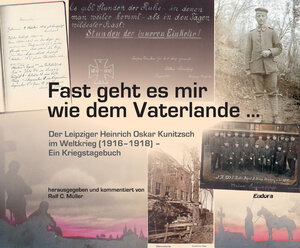
×
![Buchcover ISBN 9783938533581]()
Dieses Sachbuch präsentiert die überkommenen Egodokumente eines Leipziger Buchhändlergehilfen und setzt sie so in Beziehung, daß ein authentisches Bild der Kriegswirklichkeit im Ersten Weltkrieg und der Innenwelt des Protagonisten entsteht. Es ist deshalb für jeden historisch Interessierten eine informative Lektüre, durch die theoretische Einordnung auch für Studierende und Lehrende der Historischen Wissenschaften. Es bietet zudem Schülern einen leicht nachvollziehbaren und illustrativen Zugang zur Geschichte des Ersten Weltkriegs.
»Fast geht es mir wie dem Vaterlande …«
Der Leipziger Heinrich Oskar Kunitzsch im Weltkrieg (1916–1918) – Ein Kriegstagebuch
herausgegeben von Ralf C. MüllerHeinrich Oskar Kunitzsch from Leipzig has left behind numerous self-testimonies, including a diary of his time as a soldier in World War I, a photo-album, field letters and postcards, and a collection of quotations. All documents reveal a deep insight into the character and the mindscape of a young man, who – after finishing his apprenticeship as a bookseller – is levied into the military and had been experiencing the horrors of the war for 18 months, before he fell ill with a life-threatening illness. The special value of the sources lies in their authenticity, which is – taken by itself – not unproblematic.
This book attempts to reconstruct the inner and outer world of Oskar Kunitzsch by relating the different sources to each other and thus let them speak in many ways, whereby the reader himself possesses an important role in the course of construction, which in turn might unfold nuances of interpretation and extend the subjective example to the general line of history.
This book attempts to reconstruct the inner and outer world of Oskar Kunitzsch by relating the different sources to each other and thus let them speak in many ways, whereby the reader himself possesses an important role in the course of construction, which in turn might unfold nuances of interpretation and extend the subjective example to the general line of history.


